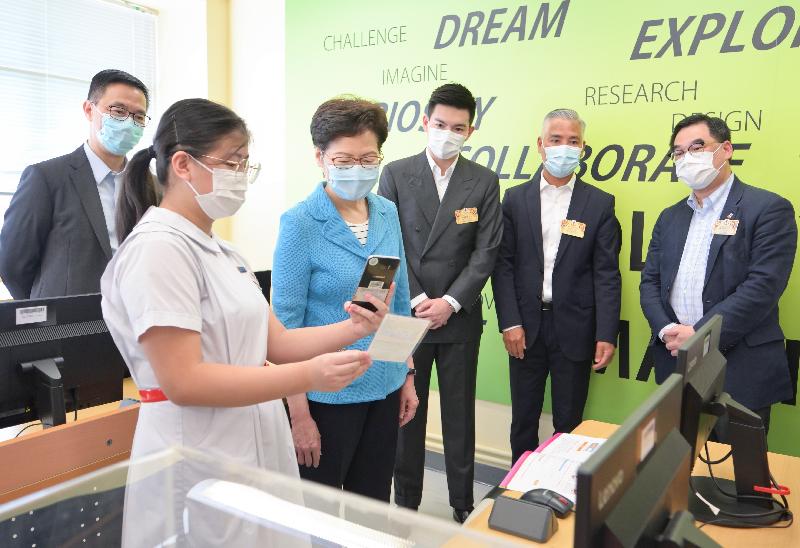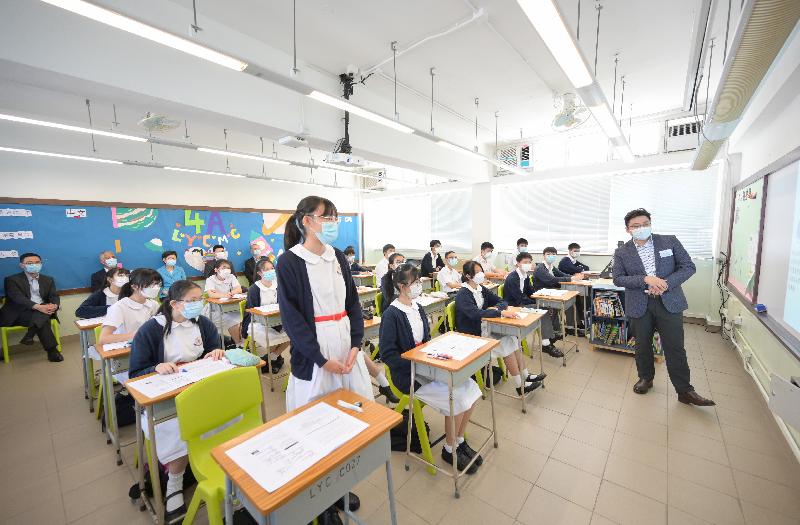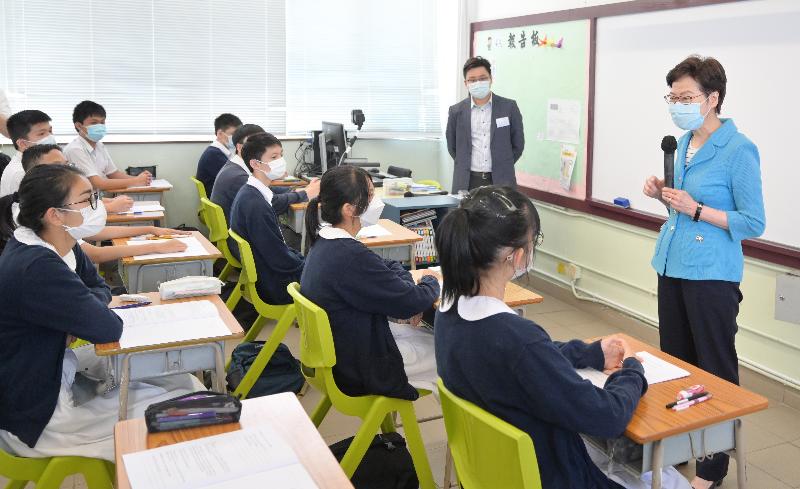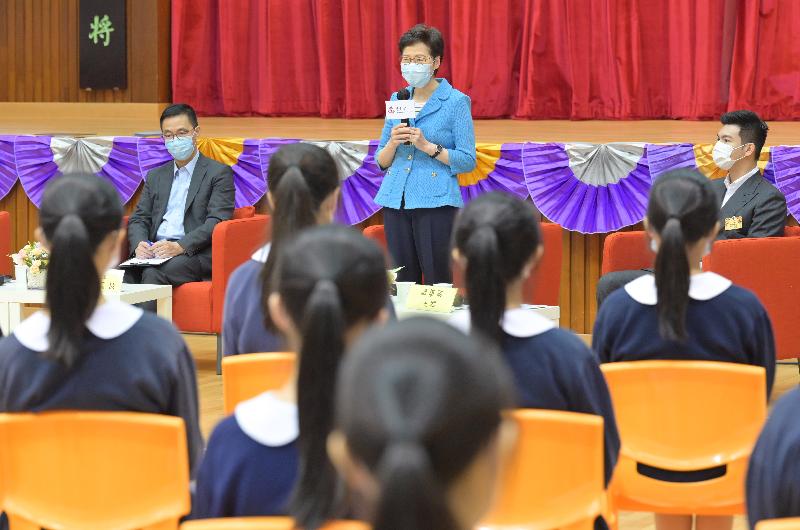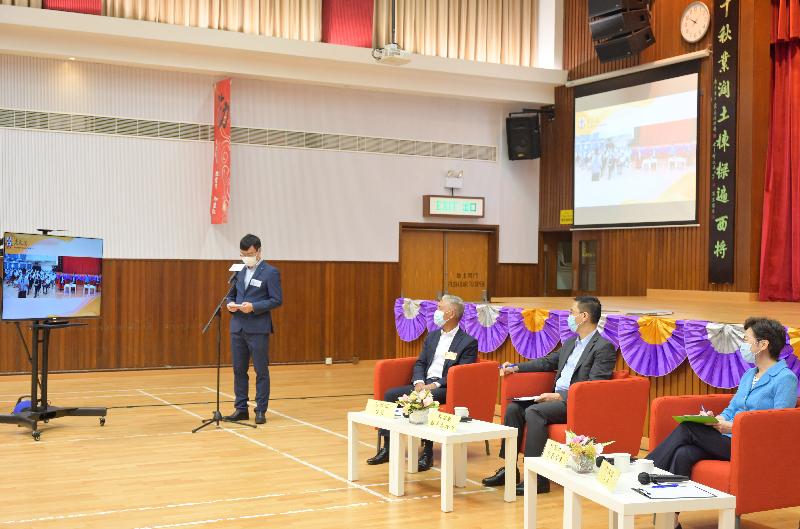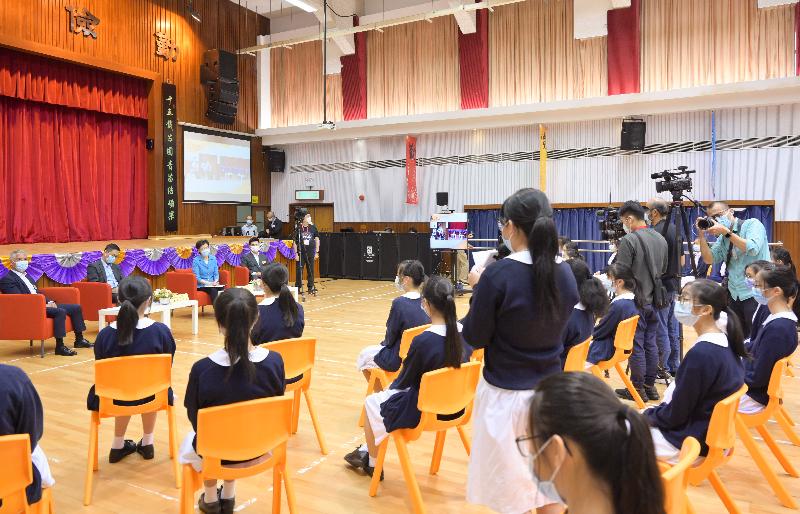The Chief Executive, Mrs Carrie Lam, today (September 9) visited Tung Wah Group of Hospitals (TWGHs) Lui Yun Choy Memorial College in Tseung Kwan O, following her visit to a secondary school in Tsing Yi last week, to learn more about the promotion of science, technology, engineering and mathematics (STEM) education in the school and participate in a Citizenship and Social Development class. She also attended a session with students to listen to their views and suggestions on the upcoming Policy Address.
Accompanied by the Secretary for Education, Mr Kevin Yeung; the Chairman and Honorary Supervisor of the TWGHs, Mr Kazaf Tam; and the Supervisor of TWGHs Lui Yun Choy Memorial College, Mr Willie Lui, Mrs Lam listened to a briefing by the school on its STEM education curriculum and viewed a display of STEM teaching materials, including robotics, augmented reality and 3D printing technology. Mrs Lam then visited Secondary Four students to learn more about their learning of Citizenship and Social Development and the teaching of the first theme under the subject, Hong Kong under "One Country, Two Systems" and the position and duties of the Chief Executive. Mrs Lam was invited by the teacher to elucidate Hong Kong's unique advantages under "One Country, Two Systems", the organic integration of the Central Authorities' overall jurisdiction over the Hong Kong Special Administrative Region (HKSAR) and the HKSAR's high degree of autonomy, as well as the constitutional arrangement of the dual responsibility of the Chief Executive to both the Central People's Government and the HKSAR.
Starting from Secondary Four this school year, the Citizenship and Social Development subject, in lieu of Liberal Studies, has become one of the four senior secondary core subjects together with Chinese Language, English Language and Mathematics. The themes of the Citizenship and Social Development subject include Hong Kong under "One Country, Two Systems" and the country since its reform and opening up. The former is about the relationship between the country and the HKSAR to help students understand the essence of "One Country, Two Systems", the constitutional basis founded upon the Constitution and the Basic Law, and the understanding of the country, while the latter helps students appreciate the development process of the country from the domestic and international perspectives. The Citizenship and Social Development subject also covers economics, technology, sustainable development and public health to allow students to understand the contemporary world facing human beings to broaden their horizons.
"Together with other senior secondary subjects, the Citizenship and Social Development subject, which has become a senior secondary core subject this year, allows students to build a broad knowledge base and cultivate positive values by learning issues about Hong Kong, the country and the contemporary world, and to become a new generation with a sense of social responsibility and national identity, an affection for Hong Kong and an international perspective. I am pleased to have visited the school at the beginning of the school year to see that the school, teachers and students are devoted to the teaching and learning of the subject. The Education Bureau will continue to provide relevant support to schools," Mrs Lam said.
Mrs Lam then proceeded to the school hall to attend a session with students on the upcoming Policy Address. In addition to some 60 senior secondary students of the school, about 1 000 students from 17 other TWGHs schools joined the session through video conferencing. During the session, which lasted about an hour, more than 10 students put forward their views covering education, youth development, environmental protection and more. The students also expressed other views on topics such as heritage conservation and development of art and culture.
Mrs Lam thanked students for their active participation in giving views. She said that the upcoming Policy Address will be the last one in her five-year term, but it will map out Hong Kong's future developments and integration into the national development with a long-term vision. The Policy Address will also set out proposals on land and housing, which are of concern to the people, as well as relevant long term infrastructure development. She appealed to the students to pay attention to the upcoming Policy Address, which will be delivered on October 6.
Follow this news feed: East Asia






